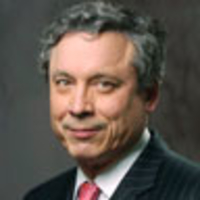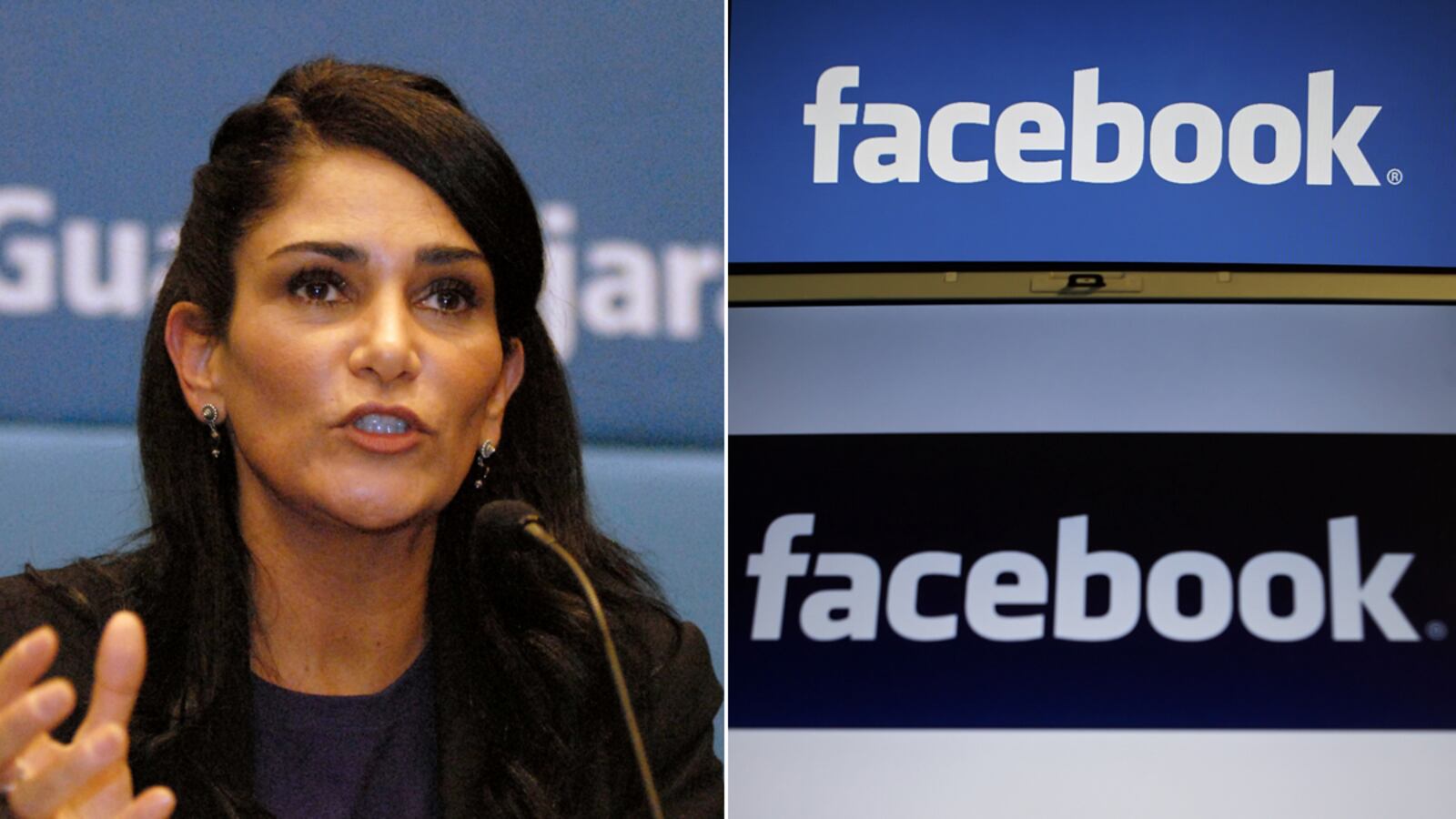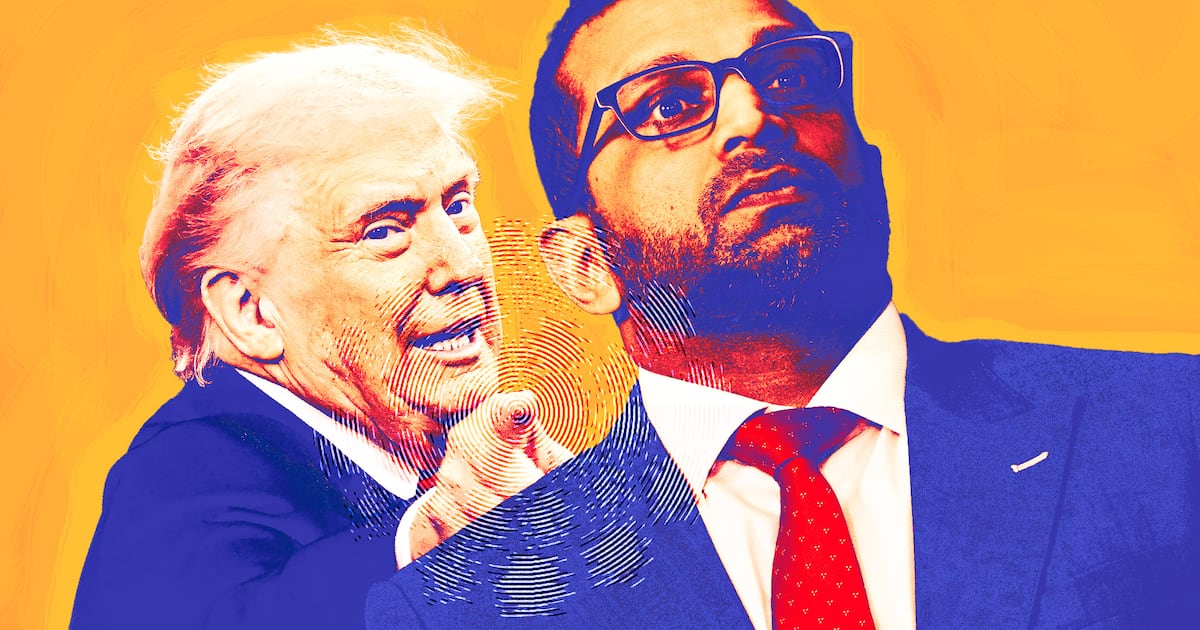A prominent human-rights activist says Facebook vanquished her profile from the site after she accused the site of becoming a stomping ground for pedophiles—and not doing enough to combat the problem.
Lydia Cacho Ribeiro, a Mexican investigative journalist and activist known for busting pedophile rings, told The Daily Beast that her profile disappeared around six months ago, after she wrote posts saying that pedophiles and child pornographers use the site as a tool to troll for victims and swap notes. She alerted Facebook to the pedophile problem as well, she says, and that’s when she says her profile disappeared. (A public-figure profile remains on the site, but no personal profile.)
Cacho Ribeiro spoke to The Daily Beast in New York City, after accepting the Civil Courage Prize last Wednesday night from the Train Foundation, an organization that awards an annual $50,000 prize to human-rights activists.
A representative from Facebook had no immediate comment on whether or not Cacho Riberio’s profile had been removed, but said the company would look into it. The company also sent a policy statement, saying, “Facebook is not—and has never been—in the business of disabling accounts or removing content simply because people are discussing controversial topics. On the contrary, we want Facebook to be a place where people can openly express their views and opinions, even if others don’t agree with them.”

Further, the company said, “It’s incorrect to assume that in every case where a person’s account is disabled, or a piece of content is removed, it’s because of the nature of the content itself. There are a few types of content that we don’t allow, such as nudity and pornography, hate speech and threats of real physical violence, but sensitive topics are not against our policies. When we take action on an account or piece of content, it’s nearly always for one of the following two reasons: The content or behavior associated with the account was reported to us by people on Facebook, and we reviewed it and determined that it violated our community standards. [Or] it was flagged by one of our automated systems for preventing spam and other annoying behavior. Examples of behavior that might be flagged include having a high percentage of friend requests ignored or marked as spam, or sending lots of friend requests or messages to members of the opposite sex who are not your friends.”
When Cacho Ribeiro accepted the Civil Courage Prize last week in New York, she challenged United Nations Under-Secretary-General Michelle Bachelet and 130 others in attendance to join her in campaigning to pressure Facebook to take serious action against child abusers. “If anyone has the power to do it, talk to the owners and CEO of Facebook to stop child pornography that is going on Facebook every day,” she said. “We are seeing thousands of children—babies from 2 and 3 months old to girls from 7 to 10 years old—that are being sold, and having pictures taken by guys, predators, on Facebook,” she continued. “Stop Facebook. Tell them to stop child pornography.”
Facebook strongly denied the accusations when contacted by The Daily Beast. Joe Sullivan, the company’s chief of security, said Facebook’s security software constantly searches the site’s pages for evidence of sexual predators and child abusers. Every picture uploaded by Facebook users is run through a program called “Photo DNA,” he said, to look for possible matches with known child abuse images contained in the database of the National Center for Missing and Exploited Children. The company saves the data, he said, and makes referrals to law-enforcement agencies.
Cacho says Facebook, by dealing only with images in National Center database, fails to detect thousands of pictures posted by would-be exploiters of children whose dirty work has not yet been detected by law enforcement.
The company concedes that it is under attack from offenders all the time—and says it knows their tricks. When an offender is “trying to target someone on Facebook, that person is going to lie about their name or age or both…our systems are designed to prevent that kind of abuse,” said Sullivan. “When someone is creating a fake account on Facebook to try and solicit 15-year-old females…they are going to send all their ‘friend’ requests to 15-year-old girls. That is going to be caught in our filters. It is going to be flagged and their accounts are going to be disabled.”
Facebook says it has more than 800 million users who upload nearly a billion pictures a day. The company will not reveal how many customer profiles it has for minors, but outside researchers estimate Facebook has profiles for more than 3 million girls, ages 13 to 17, in the United States alone. The company also declines to release any statistics about the numbers of Facebook pages it closes as a result of detecting possible abuse.
Cacho Ribeiro first gained international attention as a journalist and activist in the nineties in Cancun, Mexico, where she established a high-security shelter for female victims of domestic violence and human trafficking. In 2004, she exposed high-profile businessmen and politicians involved in a child-pornography ring in her book Demons of Eden. Now the author of seven books, she recently accused the Mexican drug cartels of smuggling underage girls to the U.S. for prostitution.
When told of Facebook’s response to her criticisms, Cacho Ribeiro said she questions the company’s resolve.
There has been no comprehensive national or international study of how effective Facebook has been in stopping sexual predators or how well it has helped prosecutors develop cases, says Scott Burns, executive director of the National District Attorneys Association. He added, “By the sheer volume, I would say Facebook has some basis to say, look, we do the very best we can, but in the same breath, we are not the international police agency of social media. We simply don’t have thousands of trained investigators combing Facebook and following up cases. It is up to law enforcement to make the request and seek assistance, and then hopefully it is up to Facebook to comply as best they can under the law.”






